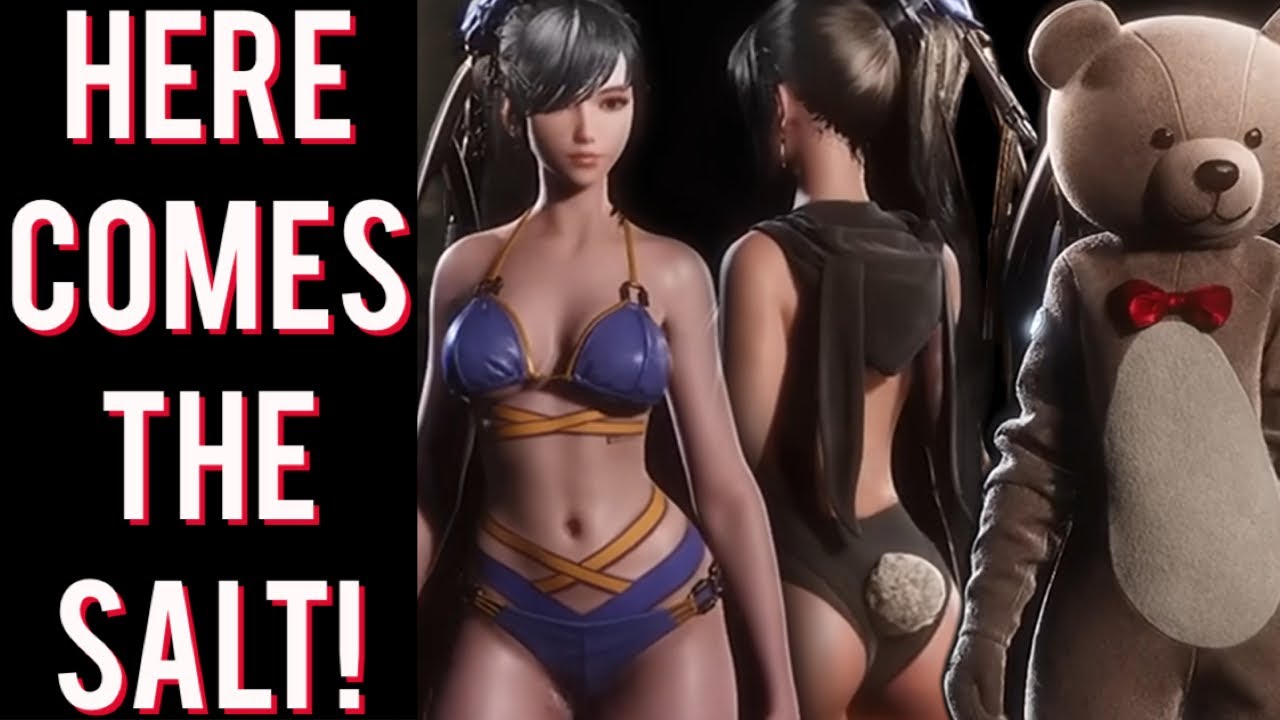Stellar Blade Just BROKE the Internet! 🔥
Why is Stellar Blade’s PC launch smashing records?
Some say it’s the epic combat.
Others whisper it’s the media’s meltdown over Eve.
What’s driving this sales explosion?
You won’t believe the real story!
Click to dive into the chaos! 👇

Stellar Blade, the action RPG developed by South Korean studio Shift Up, has taken the gaming world by storm with its PC release on June 11, 2025. Posts on X claim the game’s sales have “exploded” due to “media hacks crying in reviews,” pointing to a narrative where critical backlash over the game’s sexualized protagonist, Eve, has fueled its popularity. Reports confirm Stellar Blade sold over 1 million copies on PC in just three days, contributing to a total of 3 million units across PS5 and PC, making it the highest-performing single-player PlayStation game on Steam. But is the media controversy truly the driving force behind this success, or is there more to the story? This article examines the sales surge, the role of media discourse, and the broader dynamics of gaming culture, drawing on recent reports and critical analysis.
The Numbers: A Record-Breaking Launch
Stellar Blade’s PC launch was nothing short of historic. Within 24 hours, the game hit a peak of 104,311 concurrent players on Steam, surpassing previous PlayStation PC port records like Marvel’s Spider-Man Remastered (66,436) and Ghost of Tsushima (77,000). By June 14, 2025, the concurrent player count reached 188,576, the highest for any single-player Sony-published title on Steam, only trailing the multiplayer hit Helldivers 2. SteamDB reports a 92.5% “Very Positive” rating from over 19,000 user reviews, and Shift Up confirmed the game pushed the franchise past 2 million lifetime units, with PC sales alone generating significant revenue. These figures, backed by posts on X from sources like @VGChartz and @RPGSite, underscore the game’s commercial triumph.
The PC version’s success was anticipated by Shift Up, who noted in a February 2025 financial report that the “higher market share” for PC gaming, especially in Asia, would likely lead to sales surpassing the PS5 version. The game’s technical optimizations—DLSS 4, unlocked frame rates, ultrawide support, and DualSense compatibility—ensured a smooth experience, earning praise from players and critics alike. A Metacritic score of 81 and a 9.2 user rating further highlight its quality. But while the game’s merits are clear, the narrative around media controversy demands scrutiny.
The Controversy: Media “Crying” or Legitimate Critique?
The claim that Stellar Blade’s sales exploded due to “media hacks crying in reviews” originates from a vocal segment of the gaming community, amplified by X posts like those from @YellowFlashGuy and @MrRomyRome. These posts suggest that negative reviews, particularly those criticizing Eve’s sexualized design, backfired by drawing attention to the game. This narrative paints media outlets as out-of-touch puritans whose complaints about “fan service” inadvertently boosted sales among players rejecting “woke” sensibilities.
There’s some basis for this view. Stellar Blade has been divisive since its PS5 debut on April 26, 2024, with Eve’s appearance—modeled after South Korean model Shin Jae-eun and featuring revealing outfits and exaggerated “jiggle physics”—sparking heated debate. Outlets like GamesRadar and Eurogamer noted the dissonance between Eve’s sexualized presentation and the game’s serious narrative, arguing that outfits like lingerie and bunny suits felt forced and clashed with her character arc. Kotaku’s review, while praising the combat, called the sexualization “sleazy” and rooted in outdated gaming tropes. These critiques led to accusations of “woke” bias, with some fans on X and Reddit’s r/KotakuInAction claiming the media was trying to “sabotage” the game.
However, the “media meltdown” narrative is overstated. Most reviews were positive, with OpenCritic and Metacritic aggregating scores that highlight the game’s strengths: fluid combat, stunning visuals, and a killer soundtrack. IGN gave it a 7/10, praising the “rock-solid” Sekiro-inspired combat while critiquing the lackluster story and RPG mechanics. PCMag awarded it an Editors’ Choice, calling it an “outstanding” action game. Even Kotaku’s review acknowledged, “It isn’t perfect, but in its best moments, Stellar Blade is still pretty stellar.” The notion that critics universally “cried” over Eve ignores the balanced coverage, with only a handful of outlets focusing heavily on her design.
The Backlash Effect: Did Controversy Drive Sales?
The idea that controversy fueled Stellar Blade’s sales isn’t new. A February 2024 article from ClownfishTV noted that PS5 pre-orders outpaced Final Fantasy VII Rebirth after early backlash over Eve’s appearance, suggesting gamers rallied against perceived media boycotts, similar to Hogwarts Legacy’s success amid transphobia controversies. X posts from June 2025 echo this, with @SmashJT claiming the PC launch “destroyed the wokie narrative.” This aligns with a broader trend where polarizing games benefit from “anti-woke” sentiment, as fans purchase titles to “own” critics.
Steam reviews provide some evidence. Many gush over Eve’s appearance, with comments like “I logged in for combos, but stayed for the bounce” or “This wasn’t a gaming session. This was a spiritual awakening wrapped in latex.” The rapid creation of risqué mods—hundreds within hours of launch—further highlights the “thirsty” fanbase’s enthusiasm. Shift Up leaned into this, promoting the VR mode with a combat-focused video that subtly emphasized Eve’s appeal. These factors suggest the controversy amplified visibility, drawing players who might not have otherwise noticed the game.
Yet, attributing sales solely to backlash oversimplifies the picture. Stellar Blade’s combat, often compared to NieR: Automata and Sekiro, is a major draw. Reviews consistently praise its parry-dodge mechanics, deep skill trees, and satisfying boss fights. The game’s post-apocalyptic world, while narratively shallow, offers compelling exploration and a stellar soundtrack. Its Asian market appeal, boosted by the success of titles like Black Myth: Wukong, also played a role, as Shift Up noted in financial reports. The PC version’s technical polish and modding potential further broadened its audience, suggesting quality and accessibility were as critical as controversy.
Gaming Culture: A Broader Battleground
The Stellar Blade saga reflects deeper tensions in gaming culture. The debate over Eve’s design echoes past controversies around characters like Bayonetta or 2B from NieR: Automata, where sexualization is both celebrated and criticized. Supporters argue that Eve’s design is a valid artistic choice, rooted in Shift Up’s mobile gaming history (Nikke: Goddess of Victory) and South Korean aesthetics. Critics counter that it perpetuates objectification, especially when the game’s serious tone clashes with “sleazy” elements like jiggle physics.
This divide is often framed as a “culture war.” X posts and Reddit threads on r/GGdiscussion and r/KotakuInAction portray Stellar Blade as a victory for “real gamers” against “woke” media and developers pushing DEI (diversity, equity, inclusion) agendas. Comments like “Chuds vs the modern audience” or “Horny can never be defeated” reflect a belief that the market favors traditional designs over progressive ideals. Conversely, r/Gamingcirclejerk mocks this narrative, arguing that the “anti-woke” defense is less about gaming and more about validating fragile egos, with sales (2% of PS5’s install base) overhyped to push an agenda.
Both sides exaggerate. The “woke” media narrative ignores the diversity of reviews, while the “anti-woke” triumph downplays the game’s broader appeal. Stellar Blade’s success likely stems from a mix of factors: a solid action RPG core, a polished PC port, and yes, a controversial protagonist that sparked curiosity. The game’s ability to transcend this divide—appealing to modders, action fans, and casual players alike—underscores its versatility.
Shift Up’s Strategy: Riding the Wave
Shift Up has played its cards well. By not shying away from Eve’s sexualization while delivering a high-quality game, they catered to multiple audiences. The studio’s financial success—$151.4 million in 2024 revenue, with $43.2 million from Stellar Blade royalties—has greenlit a sequel and a new IP, Project Spirits, slated for 2027. Their decision to lift a 100-country region lock on Steam expanded the game’s reach, and ongoing updates, like a PS5 Pro patch, show commitment to the fanbase.
However, challenges loom. A South Korean finance report warns that Tencent’s 34.58% stake in Shift Up could threaten its independence, and corporate governance issues raise concerns. The studio must also navigate the polarized discourse around Eve, ensuring future titles balance artistic vision with broader appeal.
Conclusion: A Stellar Success, But Why?
Stellar Blade’s PC sales surge is a multifaceted phenomenon. The media controversy over Eve’s design undoubtedly amplified attention, drawing players curious about the “forbidden” appeal. Yet, the game’s robust combat, technical excellence, and strategic market positioning were equally critical. The narrative of “media hacks crying” driving sales is compelling but reductive, ignoring the game’s genuine strengths and the diverse motivations of its player base.
As gaming culture grapples with representation and artistic freedom, Stellar Blade stands as a case study in how controversy can both help and hinder a title. For Shift Up, the challenge is to build on this success without being defined by the culture war. For players, Stellar Blade offers a reminder that great games can spark debate, break records, and still deliver a damn good time.





